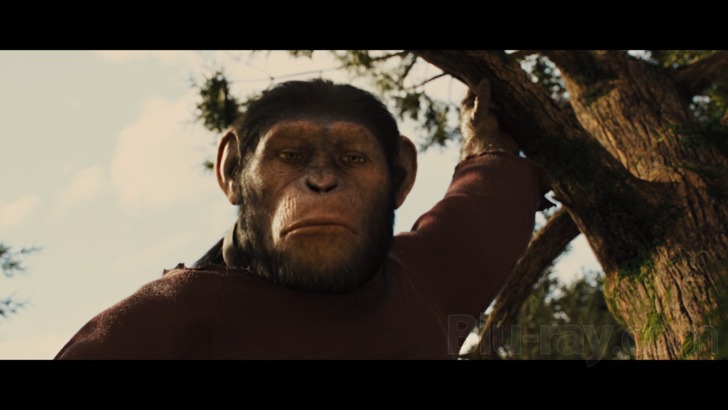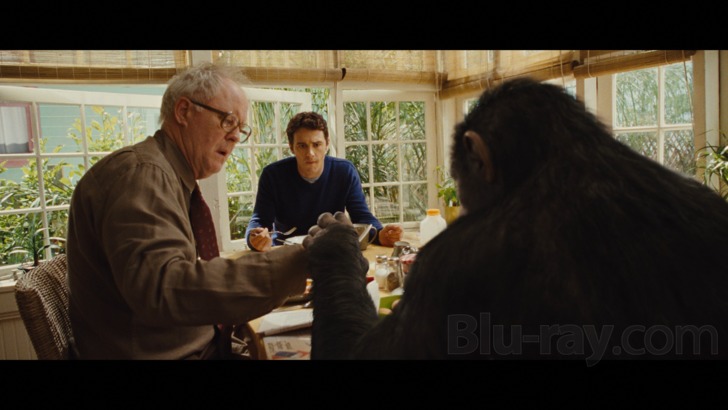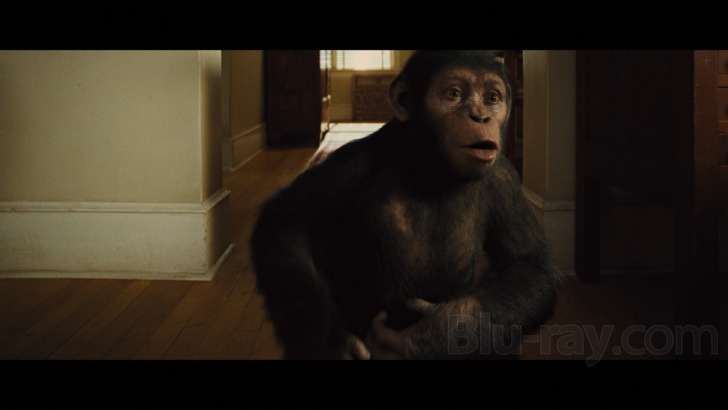Rise of the Planet of the Apes 4K Blu-ray Movie
HomeRise of the Planet of the Apes 4K Blu-ray Movie 
4K Ultra HD + Blu-ray + UV Digital Copy20th Century Fox | 2011 | 105 min | Rated PG-13 | Jun 13, 2017

Movie rating
7.8 | / 10 |
Blu-ray rating
| Users | 4.2 | |
| Reviewer | 3.5 | |
| Overall | 3.5 |
Overview
Rise of the Planet of the Apes 4K (2011)
An origin story set in present day San Francisco. Our greatest discovery will become the world's greatest threat when a scientist on the verge of a medical breakthrough begins testing on a young chimpanzee named Caesar. But when the chimp develops human-like intelligence and emotions, an epic battle ensues to determine the dominant species on the planet.
Starring: James Franco, Freida Pinto, John Lithgow, Brian Cox, Tom FeltonDirector: Rupert Wyatt
| Action | Uncertain |
| Sci-Fi | Uncertain |
| Thriller | Uncertain |
| Drama | Uncertain |
Specifications
Video
Video codec: HEVC / H.265
Video resolution: 4K (2160p)
Aspect ratio: 2.35:1
Original aspect ratio: 2.39:1
Audio
English: DTS-HD Master Audio 5.1
Spanish: Dolby Digital 5.1
French: DTS 5.1
Spanish: DTS 5.1
German: DTS 5.1
Italian: DTS 5.1
Subtitles
English SDH, French, German, Italian, Spanish, Cantonese, Danish, Dutch, Finnish, Mandarin (Simplified), Norwegian, Swedish
Discs
Blu-ray Disc
Two-disc set (2 BDs)
UV digital copy
4K Ultra HD
D-Box
Packaging
Slipcover in original pressing
Playback
Region A (locked)
Review
Rating summary
| Movie | 3.5 | |
| Video | 4.5 | |
| Audio | 4.5 | |
| Extras | 1.5 | |
| Overall | 3.5 |
Rise of the Planet of the Apes 4K Blu-ray Movie Review
Reviewed by Jeffrey Kauffman June 17, 2017Show business in general, and the movie industry in particular, can be a cruel mistress, with seemingly no rational explanation for what appeals to either the ticket buying populace or those curmudgeonly critic types. Simply contrasting two now iconic 1968 science fiction films is a salient case in point. If various online sources are to be believed, 2001: A Space Odyssey and Planet of the Apes opened either on the same April day, or within a day or two of each other, but the films’ ambitions and ultimate fates really couldn’t be more different. Kubrick’s brainy and seemingly opaque opus was greeted with a mixture of consternation and even derision, at least initially, making decent if not outrageously huge money on its original roadshow release (and then going on to huge receipts as its cult reputation grew and subsequent rereleases followed). Planet of the Apes had no similar high falutin’ goals, and as my colleague Casey Broadwater mentioned in his Rise of the Planet of the Apes, the original pentalogy were really gussied up B movies for all intents and purposes, though the first film’s screenplay by Michael Wilson and Rod Serling did have a certain intellectual acuity mixed in with somewhat sillier elements. The first film nonetheless received much more consistently positive reviews than Kubrick’s film did, and while its ultimate box office haul was dwarfed by 2001: A Space Odyssey’s performance, at the time Planet of the Apes was considered “the” science fiction success story of 1968. Planet of the Apes’ perhaps unexpected connection with the ticket buying populace was a much needed bright spot for 20th Century Fox, then in the midst of severe reeling from a number of either extraordinarily expense films which at least recouped some of their money at the boxoffice (Cleopatra ), or extraordinarily expenseve films which more or less tanked at the box office (Doctor Dolittle, Star!, the latter of which wouldn’t appear until a few months after 2001: A Space Odyssey and Planet of the Apes had both debuted). That in turn may have helped grease the wheels for the large number of follow up properties to the first film which appeared, not to mention a relatively short lived television series, and then in 2001 Tim Burton’s Planet of the Apes remake, one which ironically met with the same sort of bifurcated critical response that 2001: A Space Odyssey initially had. The film nonetheless raked in several hundred million dollars, but it still wasn’t until a decade or so later when screewriters Rick Jaffa and Amanda Silver and director Rupert Wyatt went back to the drawing board and came up with Rise of the Planet of the Apes, which has now led to Dawn of the Planet of the Apes and the highly anticipated War for the Planet of the Apes, suggesting this franchise is going to be going strong for the foreseeable future. 20th Century Fox Home Entertainment is now revisiting Rise of the Planet of the Apes and Dawn of the Planet of the Apes in 4K UHD in what is an obvious marketing tie in to the upcoming Apes theatrical release.

For a recap of Rise of the Planet of the Apes' plot, please refer to Casey's Rise of the Planet of the Apes Blu-ray review.
Rise of the Planet of the Apes 4K Blu-ray Movie, Video Quality 

Note: The included screenshots are sourced from a 1080p Blu-ray disc. Watch for 4K screenshots at a later date.
Rise of the Planet of the Apes is presented on 4K UHD courtesy of 20th Century Fox Home Entertainment with a 2160p transfer in 2.35:1. As
Casey noted in his Rise of the Planet of the Apes Blu-
ray review, perhaps surprisingly given the number of digital special effects prevalent throughout this entry, Rise was shot on film and
finished at a 2K DI. The 4K UHD version shows noticeable but relatively subtle upticks in fine detail, though I have to say not always to the benefit of
some of
the CGI. Perhaps a little unexpectedly, I found young Caesar especially to look at least a bit more "animated" (as in "fake" and cartoonish) looking than in
the 1080p
Blu-ray version. That said, when the camera focuses on humans and exploits close-ups, fine detail is often very commendable, revealing elements like
the almost minute
stubble on John Lithgow's face. The long dark sequences with the various species caged in the jail like environment also show at least marginally
increased shadow detail. The fog enshrouded scene late in the film on the Golden Gate Bridge also shows a kind of interesting new precision, as well as a
slightly different cast to some of the grays. Despite a large number of pretty aggressive pans, I experienced little to no judder. While the fine grain field
really encounters no serious issues, there is a slight tendency for a yellowish quality to intrude in it, albeit slightly, at times.
Rise of the Planet of the Apes 4K Blu-ray Movie, Audio Quality 

The 4K UHD disc features the same DTS-HD Master Audio 5.1 track assessed by Casey in his Rise of the Planet of the Apes Blu-ray review, and I am reproducing his score for the audio here. Some may find it disappointing that Fox didn't upgrade the audio to either Dolby Atmos or DTS:X for this release.
Rise of the Planet of the Apes 4K Blu-ray Movie, Special Features and Extras 

Only the two commentary tracks detailed by Casey in his Rise of the Planet of the Apes Blu-ray review are ported over to the 4K UHD disc as supplements. As usual, this package also comes with a 1080p Blu-ray disc which contains all of the supplements Casey lists in his review. Additionally, this comes with a paper insert containing a code which allows streaming of a sneak preview for the upcoming War for the Planet of the Apes.
Rise of the Planet of the Apes 4K Blu-ray Movie, Overall Score and Recommendation 

Rise of the Planet of the Apes successfully rescued this franchise from what was seen by some as the failure of Tim Burton's Planet of the Apes, and with the success of this film and Dawn of the Planet of the Apes, there's little doubt that there will probably be at least two more films after the upcoming War for the Planet of the Apes, to make a whole "new, improved" pentalogy for fans to enjoy. The 4K upgrade probably isn't mind blowing, but it's noticeable, though it's probably going to disappoint some consumers that Fox didn't upgrade the audio to Dolby Atmos or DTS:X, and that only the commentaries have been ported over to the 4K UHD disc.
Other editions
Rise of the Planet of the Apes: Other Editions

Rise of the Planet of the Apes
2011

Rise of the Planet of the Apes
Movie Only Edition
2011

Rise of the Planet of the Apes
2011

Rise of the Planet of the Apes
2011

Rise of the Planet of the Apes
2011

Rise of the Planet of the Apes
2011

Rise of the Planet of the Apes
2011
Similar titles
Similar titles you might also like

Dawn of the Planet of the Apes 4K
2014

Real Steel
2011

District 9 4K
2009

Hulk 4K
2003

War for the Planet of the Apes
2017

Resident Evil: Afterlife 3D
2010

Pacific Rim: Uprising 4K
2018

Elysium 4K
2013

Lucy 4K
2014

Chappie
2015

Lockout
Unrated Edition
2012

Alien: Resurrection
1997

Transcendence
2014

V for Vendetta 4K
2005

Beneath the Planet of the Apes
1970

Escape From the Planet of the Apes
1971

Transformers: Dark of the Moon
2011

The Terminator 4K
40th Anniversary
1984

Alien³
1992

Transformers: Revenge of the Fallen 4K
2009